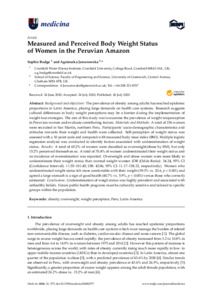Measured and perceived body weight status of women in the Peruvian Amazon
Budge, Sophie and Jaworowska, Agnieszka (2020) Measured and perceived body weight status of women in the Peruvian Amazon. Medicina, 56 (8):375. ISSN 1010-660X (Online) (doi:10.3390/medicina56080375)
![Open Access Article [thumbnail of Open Access Article]](https://gala.gre.ac.uk/29681/2.hassmallThumbnailVersion/29681%20JAWOROWSKA_Measured_And_Perceived_Body_Weight_Status_Of_Women_In_The_Peruvian_Amazon_%28OA%29_2020.pdf)  Preview |
PDF (Open Access Article)
29681 JAWOROWSKA_Measured_And_Perceived_Body_Weight_Status_Of_Women_In_The_Peruvian_Amazon_(OA)_2020.pdf - Published Version Available under License Creative Commons Attribution. Download (320kB) | Preview |
Abstract
Background and objectives: The prevalence of obesity among adults has reached epidemic proportions in Latin America, placing large demands on health care systems. Research suggests cultural differences in body weight perceptions may be a barrier during the implementation of weight-loss strategies. The aim of this study was to examine the prevalence of weight misperception in Peruvian women and evaluate contributing factors. Materials and Methods: A total of 236 women were recruited in San Martín, northern Peru. Participants’ socio-demographic characteristics and attitudes towards their weight and health were collected. Self-perception of weight status was assessed with a 10-point scale and compared with measured body mass index (BMI). Multiple logistic regression analysis was conducted to identify factors associated with underestimation of weight status. Results: A total of 65.2% of women were classified as overweight/obese by BMI, but only 15.2% perceived themselves so. A total of 70.4% of women underestimated their weight status and no incidence of overestimation was reported. Overweight and obese women were more likely to underestimate their weight status than normal weight women (OR (Odds Ratio): 34.24, 95% CI (Confidence Interval): 11.55–101.45; OR: 42.06, 95% CI: 11.17–158.32, respectively). Women who underestimated weight status felt more comfortable with their weight (59.3% vs. 20.6, p < 0.001) and agreed a large stomach is a sign of good health (40.7% vs. 5.9%, p < 0.001) versus those who correctly estimated. Conclusions: Underestimation of weigh status was highly prevalent and associated with unhealthy beliefs. Future public health programs must be culturally sensitive and tailored to specific groups within the population.
| Item Type: | Article |
|---|---|
| Uncontrolled Keywords: | obesity, overweight, weight perception, Peru, Latin America |
| Subjects: | R Medicine > RA Public aspects of medicine > RA0421 Public health. Hygiene. Preventive Medicine |
| Faculty / School / Research Centre / Research Group: | Faculty of Engineering & Science Faculty of Engineering & Science > School of Science (SCI) |
| Last Modified: | 21 Sep 2020 14:52 |
| URI: | http://gala.gre.ac.uk/id/eprint/29681 |
Actions (login required)
 |
View Item |
Downloads
Downloads per month over past year
 Tools
Tools Tools
Tools